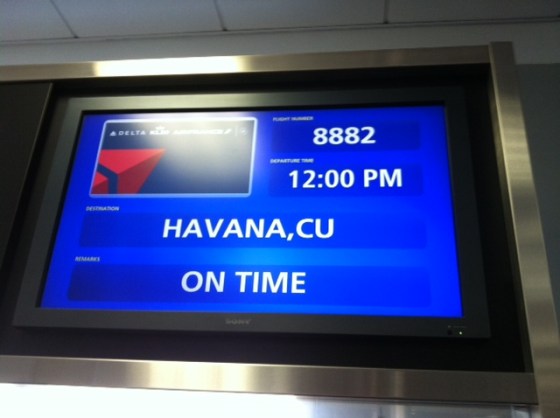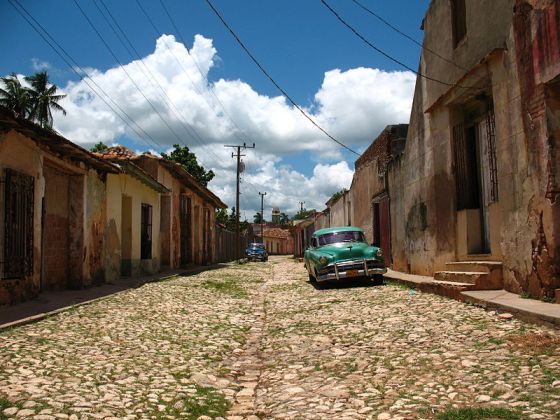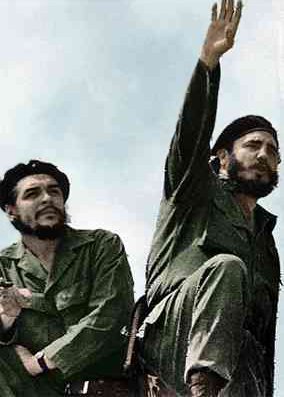 This morning, Larry & I are leaving with 3 professors and 8 Oglethorpe University students for Havana, Cuba. It’s a non-stop flight from Atlanta — which is kind of hard to believe, given the tortured history of our two countries.
This morning, Larry & I are leaving with 3 professors and 8 Oglethorpe University students for Havana, Cuba. It’s a non-stop flight from Atlanta — which is kind of hard to believe, given the tortured history of our two countries.
Cuba is the largest and most populous island nation in the Caribbean, with 11 million people. In 1952, Fulgencio Batista staged a coup and upended democratic elections, which led to a revolutionary party of 82 people landing in Cuba on December 2, 1956 led by the inimitable Fidel Castro. Two years later, with the handwriting on the wall, the U.S imposed an arms embargo, cutting off weapons to Batista and on January 1, 1959, Batista fled the country — which means that New Year’s Eve (I’ll be there!) is a very big night in Havana!
Over the following years, Castro’s revolutionary government expropriated $25 billion of private property with little or no compensation, nationalized public utilities, tightened controls on the private sector, shut down the notorious gambling industry, and instituted a national program of healthcare & education — reforms which led to hundreds of thousands of Cubans fleeing the country, while dramatically improving the lives of the poor. In 1960 and 61, the CIA tried to assassinate Castro (in collusion with the Chicago mafia that controlled the gambling in Cuba), which probably led to the Bay of Pigs invasion, an attempt by U.S.-trained Cuban nationals to unseat Castro which ended in abject defeat after a mere three days.
Cuba found succor in a close relationship with the Soviet Union – which led to the Cuban Missile Crisis of 1961, after the Russians retaliated to U.S. missiles being placed in Turkey and the Middle East by placing nuclear missiles 90 miles from Florida. The showdown was a hair’s breadth from nuclear Armageddon (every elementary school kid of that era can remember the hilariously inept “duck and cover” drills), and shortly thereafter, in 1963, the USA imposed a complete diplomatic and economic embargo of our neighbor to the south.
Where we’re going today.
 There is no cell phone coverage in Cuba, and internet use is strictly monitored. You can’t use credit cards and there’s a big surcharge on using American dollars, so we’re taking Canadian money. I’m also lugging around my big camera because it’s meant to be a photographer’s paradise.
There is no cell phone coverage in Cuba, and internet use is strictly monitored. You can’t use credit cards and there’s a big surcharge on using American dollars, so we’re taking Canadian money. I’m also lugging around my big camera because it’s meant to be a photographer’s paradise.
And although Cuba suffered greatly after the collapse of its biggest ally, the Soviet Union, today the country has a 99.8% literacy rate, an infant death rate lower than most developed countries, and is the only nation in the world that has met the World Wildlife Fund’s definition of sustainable development. Having said that, Cuba is also claimed by the Human Rights Watch to have repressed nearly all forms of political dissent, and it has the second-highest number of imprisoned journalists of any nation in the world, bested only by China.
I’m so eager to see what it’s like! Stay tuned … I’ll be back and posting on January 1!




Oh boy, I cannot wait to see more of your pictures! What a trip. Duck and cover, indeed. Happy New Year!
Hi Betty,
It’s so impressive how much of Cuba you knew before going there!
We had a photography exhibition on Cuba at the Museum last year. Fascinating photos of a fascinating country.
I’m looking forward to your story. Are you back home?
Safe travels Betty, and I am looking forward to your insights on the adventure.
Happy New Year as well to yo uall.
I am so excited to hear about Cuba. It is a destination I would love to go someday. Eric’s grandfather was a Steward in the horse racing business. He went there often for the races, and we have a picture of the Havana racetrack in 1920. PopPop and Nanna were there for Castro’s arrival and he had wonderful stories of getting his wife and employes out. I am so happy you blog and share these experiences!!
It was pretty amazing, and very thought provoking to see such an entirely different economic model in motion. The revolution is still alive, well and ever-present there — more photos of Che than you will ever see, but I have to say the poverty wasn’t nearly as intense as in other Latin American countries & you have to attribute that to the state, I think… supremely photogenic place because nothing’s been touched since the 50s. All our beautiful cars are still on the road — it’s like looking at an old film!
Amazing story about Eric’s dad!! Thanks for sharing …
Dear Betty:
I am originally from Cuba. I spent 9 years in the Castro regime and appreciate this opportunity for sharing my experience. I am impressed with the accuracy of your notes. I just have a few pieces to contribute, if I may. The Cuban Missile Crisis actually happened in October 1962. The Soviets were not as upset about the US having missiles in Turkey as they were at the prospect of another US invasion to Cuba (this was a concern to them as the result of the Bay of Bigs Invasion in April 17, 1961). The Russians wanted Cuba to themselves. The missiles served as a bargaining chip to pressure John F. Kennedy into signing an agreement for the US never to invade Cuba again.
In regard to the literacy rate in Cuba, yes, it is high, but only because the Cuban government wants everyone to be able to read the political propaganda they dish out.
In regard to the poor, yes, the Castro regime improved the lives of the poor. At the same time his economic plan destroyed the middle class. Now everyone in Cuba is poor and suffering except the VIPs in the military. The US embargo has done little to motivate Castro to stop his blatant violations on human rights. That is because unfortunately, the rest of the world did not join the US embargo.
New Year’s Eve is a day of reflection to Cuban Americans who remember how our history changed overnight from Dec. 31, 1958 to Jan. 1, 1959. Many of us hoped for a better Cuba after Batista’s tyrannical regime, but it didn’t happen. Today, 2 million Cuban Americans still remember our beautiful island with a sense of loss and a lot of nostalgia.
Enjoy, enjoy!
As a Canadian I thought, “Yep, Cuba’s nice this time of year”. It’s a favourite holiday destination for Canadians.
This was an informative and surprising post..
You got that right, Sybil — we spent most of our time in Havana, doing educational stuff, but yesterday we went to Varadero Beach about 2 hours east of the city, and there were lots of Canadians there — it’s a big hotspot, literally, which is why all you chilled Canucks head down there — brilliant!!
That is one trip I would love to make. Two of my aunts lived and died in Havana. I met them both briefly when I was around 9 years old, at that time they visited Panama; I never saw them again after that.
I’ve always hoped elations between our countries would improve so I could plan a visit to the land my relatives loved so much they would not leave when they had the chance. Have a safe trip, take lots of pictures.
Oh BOY! Mojitos in the Caribbean…what a life! Eagerly awaiting updates and pix.
Have an absolutely magical New Years!
I’ll be interested in hearing (if you come across such info) about any herbal remedies prominently featured in their agricultural lore. I know they have very good medical care and top drawer physicians. But in a country so agriculturally rich, I’m curious about the ‘wives tale’ sort of common usages of native plants there. If you don’t come across any pertinent info, the mint in a mojito IS considered medicinal in my book 😉
How wonderful! I have a friend who has been 3x as a missionary and loves Cuba – especially its amazing support of the arts. Yes, fantastic photo opps – can’t wait to see yours “next year.” Have fun!
Thanks for the history lesson, Betty. Enjoy!
WOW! Be safe and have a blast. Looking forward to hearing all about this journey.
You seriously rock. I look forward to your reports!
Have a great trip. Can’t wait to hear how it goes. My sister went to Cuba this past year and is going again this coming summer. We wanted to visit when we were living in Haiti, but we never made it–too much work to do. Bon voyage!
Kathy
Travel safely, my friend (and take lots of great photos!). Can’t wait to see what stories you write about Cuba!
Viva la Cuba! Wow. Enjoy!
You don’t lead a dull life, do you? Sounds pretty cool – will be anxious to hear more about it. Happy Cuban New year!